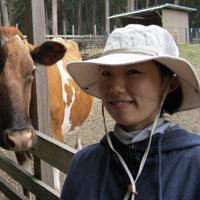
Contact: [email] junghwa<at>berkeley<dot>edu
About Me: I am a second year doctoral student in the EMST program at the University of California, Berkeley. I was born in Seoul, Korea. My background is mathematics education and I have worked as a math teacher. In my spare time, I usually stay with music stuff such as listening to music, playing the piano or cello. I had some detours in music therapy, also. Otherwise, I enjoy taking a walk in nature watching trees, flowers, and squirrels around, or listening to birds singing. These days, I happened to realize the fact that I sometimes really enjoy house chores, which was a surprise to even myself.
Areas of Interest:
Mathematics Education, Transfer of Learning, Conceptual Change in Mathematics, Student Motivation, Mathematical Problem Solving, Calculus Teaching
I am currently developing a research study on the epistemic role of causality in probability learning. In particular, I am interested to understand whether and how students perceive an event space, which they build through combinatorial analysis, as implying anticipated outcome distributions. This is an interesting question, because in order to view an event space as implying particular outcome distributions, the student must perceive the event space as actually representing the random generator itself as well as essential qualities thereof, and yet the event space may highlight qualities of the experiment that the child initially sees as irrelevant to the analysis. What cognitive and social factors enable conceptual change under these conditions? I am focusing in particular on experiments with binomial random generators. This work is building on Dor Abrahamson’s ‘Seeing Chance’ project (C&I 2009). Through data re-analysis, and possibly through gathering additional data, I am hoping to develop a more nuanced conceptualization of how learners struggle with, and eventually accept mathematical representations as signifying inference from perceptual judgment of source phenomena under inquiry.